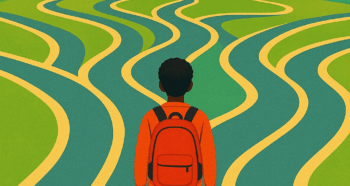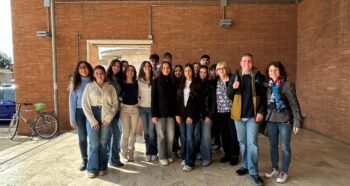What we eat and drink – and how much – has a great impact on how we function, both on a daily basis and over the longer term. Moreover, our food and drink choices don’t only impact ourselves, but also those around us. I’m sure many teachers can empathise with the fear (and consequences) of discovering that there is no morning tea or coffee in the staff room, and how this may affect their morning classes! Nutrition and eating habits can affect teaching and, consequently, the student learning experience. So, understanding this crucial interaction can help us optimise the student learning experience.
Caffeine
Caffeine comes in many forms in our diets (such as in tea, coffee, cola and energy drinks). It makes us feel alert and brings a feeling of energy to the mind and body. As such, caffeine becomes a close friend for many teachers, especially in early mornings during a long school term. However, caffeine can also have negative side effects. For example, the increased alertness can lead to an increase in anxiousness and rumination. Unfortunately, these impacts might not be obvious for 20-60 minutes after consuming the caffeine, but they can linger for hours afterwards, as the body needs around 5 hours to halve the dose of caffeine in our system. This sense of heightened anxiety may impact mental health, in the longer term, especially when other life stressors are also present. This can have an impact on the learning experience of students under the teacher’s supervision. Therefore, if a teacher is anxious about a particular event, or more generally, it may be advisable to scale back on caffeine consumption. Bear in mind though that if you are a regular caffeine consumer, removing it can lead to a few days of headaches and tiredness. Therefore, it is beneficial to plan ahead so the body can adjust to the removal of this potent ergogenic aid.
Breakfast
Many studies suggest that there are great benefits to consuming breakfast for memory recall, momentary happiness and physical activity. With this in mind, if you have a day with lots of cognitive and physical activity coming up, it could be beneficial to eat breakfast, because the negative impacts of not doing so can affect certain people quite badly. In terms of the student learning experience, a negative impact may be that a teacher has less patience in explaining a concept to a pupil or a shorter temper when dealing with a recalcitrant class. That said, we should be aware of the effects of certain food types. For example, high-sugar foods (e.g., sweets and pastries) can spike blood sugar levels and insulin secretion, making us prone to lethargy and hunger over the course of the morning. In contrast, a breakfast lower in sugar and higher in protein (e.g. eggs with bread or oatmeal with milk and nuts) can keep hunger at bay for longer, stave off lethargy and ultimately keep the mind on the activities at hand.
Routines: sustaining your energy
Routines have been shown to provide children with improved feelings of security and control. The same applies to many adults. Repeating tried and tested patterns of behaviour allows us to better predict the near future and, thus, to better engage in less-routine tasks. When it comes to teaching, this means eating tried and tested foods and having eating patterns that sustain concentration and energy throughout the day, providing a stable base for working with the unpredictability of pupils in a classroom.
Designing and developing such a food routine takes trial and error. The foods and routines available to each of us differ depending on culture, disposable income and preference. However, as a general rule, the advice from the clinical literature is similar to the advice regarding breakfast. That is, having high-protein, low-sugar foods for breakfast, lunch and dinner. For example, a beneficial meal plan might be a breakfast of eggs on toast, a lunch of a large salad with cold meats, vegetables and/or rice, and a hot dinner of meat, fish, tofu or meat-substitutes plus vegetables and a small portion of potatoes/rice.
To snack or not to snack?
Some people prefer to eat food only at three mealtimes a day, but others enjoy a snack in the morning and/or afternoon. Neither is categorically better or worse for health – it depends on the person. However, what definitely doesn’t work is to have a period in the day with low energy or mood. For non-snack consumers who have periods of hunger a couple of hours after eating a meal, you may wish to consider eating a snack and/or to re-consider the food types and portion sizes you have at main meals. For regular snack consumers, the type of snack is once again of crucial importance. The higher in sugar and less filling a snack is, the more it may affect the up-and-downs of perceived energy throughout the day. Conversely, snacking on foods lower in sugar and higher in protein (such as nuts, vegetables with hummus, or oatcakes with cream cheese) can help stave off hunger until the next meal, once again providing a stronger foundation for focussing on providing the best learning experience for students.

Conclusion
The decisions teachers make about their foods and eating patterns are crucial for maximising the effectiveness of their teaching. What works best for each of us will differ, but there are some overarching principles that can help provide a steady flow of energy. For example, keeping to a food routine and monitoring our caffeine and sugar intake, can greatly and positively influence wellbeing and thus improve teachers’ focus and patience. I believe that nutrition and eating behaviour are vitally important in the education sector, and that a greater focus on them will benefit both teachers and their students.
Further reading
- Jastran, M. M., Bisogni, C. A., Sobal, J., Blake, C., & Devine, C. M. (2009). Eating routines. Embedded, value based, modifiable, and reflective. Appetite, 52(1), 127–136. https://doi.org/10.1016/j.appet.2008.09.003
- Spence, C. (2017). Breakfast: The most important meal of the day? International Journal of Gastronomy and Food Science, 8, 1–6. https://doi.org/10.1016/j.ijgfs.2017.01.003
- Temple, J. L., Bernard, C., Lipshultz, S. E., Czachor, J. D., Westphal, J. A., & Mestre, M. A. (2017). The Safety of Ingested Caffeine: A Comprehensive Review. Frontiers in psychiatry, 8, 80. https://doi.org/10.3389/fpsyt.2017.00080





